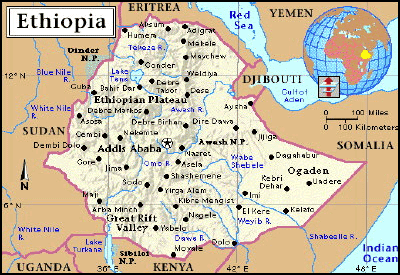Ethiopia “Yirgacheff”

This month we revisit our old friend, Ethiopia Yirgacheff. Ethiopian of course is the Alpha coffee, the evolutionary womb of the botanic species, and thus, the place where the adventure begins.
Coffee occupies a central place in the economic and social life of Ethiopians. It accounts for 60% of their national export earnings. Yet only a third of Ethiopia’s harvest is exported. One reason for this is that Ethiopians are among the highest consumers per capita of coffee in the world.
Consider the coffee drinking ceremony, described recently in the Tea & Coffee Trade Journal: “An Ethiopian host honors his guests by roasting the beans in a mighat (a tin saucepan) right then and there. The beans are then brewed in a jabana (a round bottomed, ebony-colored clay pot). Finally, lumps of frankincense or myrrh are placed on glowing coals, permeating the air with an exotic perfume.” (At Sacramento’s only Ethiopian restaurant, Queen Sheba, the coffee itself was perfumed with cloves.)
Abdullah Bagersh, grandson of the founder of one of the largest coffee exporters in Addis Ababa, placed this near-reverence in a nationalist light: “I think coffee is different in Ethiopia from anyplace else. It is something truly important for us, something that touches us inside and that we respect. Also, there is a huge sense of coffee as the life’s blood of our nation. Coffee is All, and with it we as a people sink or swim together.”
In the Kaffa region of Southern Ethiopia, at the extreme altitude of 8,000 feet, dwell the Yirgacheffe people, a minority sect of Coptic Christians. It is said that Haile Selassie used to make the Yirgacheffe coffee estate one of his summer retreats. The Yirgacheffe grow coffee as they have for centuries, in terraced plots worked by the entire family.
The big difference between Yirgacheffe and other cultivated Ethiopian coffees such as Harar is that the fruit pulp of Yirgacheff coffee is washed off after picking rather than left to dry on the seed. The purpose of such “wet” processing is to eliminate the chance of off-tastes from overripe or fermented coffee cherries, to produce what is known as a “cleaner cup”. This addresses the one complaint about Ethiopian coffees: That they are uneven in quality; intensely flavorful. but occasionally sour and fermented. This fear keeps some experts from buying all dry (or “naturally”) processed coffees.
But not us. We are regular buyers and roasters of dry processed Ethiopia Harar coffees. They are a staple of our blends. We gladly accept the occasional off note of Harar (or Yemen), for the full natural flavor they retain. We are assured of quality by carefully tasting each batch offered for sale, and by buying only through reputable importers.
At the same time we must concede that in the muted trumpet of Yirgacheffe we find the irresistable call of perfection in a cup of coffee: Smooth full bodied richness deliciously combined with bold, wine-like flavor accents. As the coffee author Kenneth Davids has writen: “Like Sumatran, its acidity vibrates inside the richness of the body, but Yrgacheffe adds a soft, fragrant, flowery note so distinctive that it may make this the most unique among the world’s coffees.”
Once virtually unknown in America, Yirgacheffe has become one of the most sought after of specialty coffees. We are proud to offer it again this year for your Autumnal season enjoyment.



